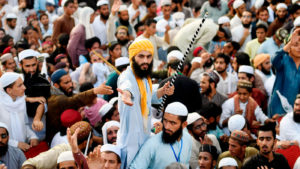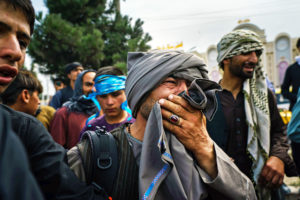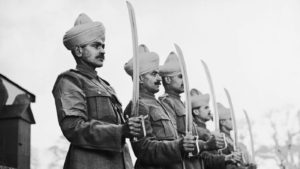Imran Khan, the 20th-century cricketer who reinvented himself as a 21st-century zealot, lives. But what is to become of his country?
Khan was shot last week at a political procession he had convened as part of his reckless agitation to topple Pakistan’s legitimate government. The failed assailant confessed he wished to assassinate Khan for leading Pakistanis astray; he succeeded only in lionising his target. Khan’s supporters are spinning his survival as evidence of their master’s superhuman qualities. But he is neither martyr nor saint: he remains one of the most pernicious political personalities in the world today.
Khan was first lofted into the prime minister’s office in 2018, in a vote manipulated by what Pakistan’s human rights commission described as the “blatant, aggressive and unabashed” interference of his sponsors in Pakistan’s mighty military, which has governed the Islamic republic directly or indirectly for most of its existence. Opponents of Khan were relentlessly harried and intimidated. Many Pakistanis experienced the election as a “soft coup”.
It is a measure of Khan’s incompetence that, despite the backing of the khakis, his party failed to secure a majority in parliament and had to enter into coalition to form government. One theory in Pakistan is that the military denied Khan a majority to keep him in check.
Khan had spent long years auditioning for the military’s favour. His very public conversion from dim-witted tabloid fodder in the West to a chillingly prudish regurgitator of anti-Western bromides in Pakistan eventually brought him the reward he craved. Some argued that Khan was wearing a mask. If so, the mask devoured his face. Khan, like the Egyptian radical Sayyid Qutb, recoiled from the West with the rage of a convert.
In 2005, for instance, Newsweek published a short article on the alleged desecration of the Koran by US soldiers. The story went unnoticed until Khan, sensing an opportunity, read every line of it at a press conference. “This is what the US is doing,” he bemoaned, “desecrating the book on which our entire faith is based.” Khan’s outraged performance provoked days of religious rioting in which 17 people were killed and dozens more gravely injured. The story was later debunked and retracted. But Khan never showed a hint of contrition. Instead, seven years after that inaugural bloodbath, he went to the hospital where Malala Yousafzai was given emergency treatment and advanced a theological defence for the Taliban’s “holy war”.
The public purveyor of iman — faith —struggled in private, according to those around him, with the haram habits he had picked up in the West. One of his ex-wives told Vanity Fair that Khan sniffed huge quantities of cocaine every night during their 10-month marriage in 2015. The momin who never tired of delivering hectoring prelections on human dignity to the West apparently also used racist language in private. He could not have been unaware of the consequences of such bigotry: after all, a kinsman of his had overseen the slaughter of three million Bengalis — a people denigrated by Pakistani officials as “black monkeys” — in 1971.
Nonetheless, as prime minister, Khan pledged to remake Pakistan into a new Medina. He took a third wife, a fully veiled clairvoyant who claimed to have had visions of his triumphs, and subordinated his temporal duties to the task of establishing himself as the champion of the Islamic ummah.
His reign embodied the confusions that have stalked Pakistan ever since its invention in 1947. Is it the homeland of Indian Muslims? Or is it the truncated residue of the medieval Arab-Islamic invaders of India? No other country celebrates its own despoilers as Pakistan does. The Arabs had stormed Sindh, now in Pakistan, in the 8th Century and spent weeks slaughtering the natives and plundering their riches. But those conquerors are the heroes in Pakistani lore, and the country’s great public works carry their name. Faith has complicated Pakistanis’ relationship to Pakistan: are they natives or aliens, progeny of the soil or foreign implants on it? Are they Indian or Arab? These aren’t academic questions: the massacre of Bengalis in 1971 was animated by the belief that they were, as the US consul-general in Dhaka at the time put it, “heretics” corrupted by veneration for their pre-Islamic customs.
Khan exemplified this crisis of identity. As prime minister, he behaved less like the leader of his country and more like the delegate of a pre-eminent global community posted in its South Asian outpost. His identification with faith eclipsed all other affinities. He radiated contempt for India, the land of his kith, and raised the spectre of nuclear war with it — but claimed kinship with faraway Turkey and Saudi Arabia in the name of faith.
The worsening plight of ordinary Pakistanis became the least of Khan’s concerns in office once he set himself up as the tribune of oppressed Muslims and began routinely lashing out at the West and other non-Muslim governments for their treatment of his co-religionists. But just as the preacher of austere faith could reconcile himself allegedly to the ecstasies of cocaine in private, the champion of Muslim dignity made convenient exceptions to his own rules in public.
The man who decried France for its “Islamophobia” gladly pitched for Zac Goldsmith’s mayoral campaign even as it sought to smear his Muslim opponent as a terror sympathiser.
Denouncing Indian democracy as a sham and all of India as the 21st-century avatar of Nazi Germany for the depredations of the Hindu-supremacist regime of Narendra Modi, Khan shrugged off the concentration camps in Xinjiang, where China is torturing millions of Muslims by re-enacting some of the most degrading atrocities from the Nazi repertoire. Heading a system that formally grants its religious minorities the status of second-tier citizens, bans them legally from holding the state’s high offices and enshrines capital punishment for blasphemy against Islam in law, Khan pushed a resolution through parliament castigating Emanuel Macron for victimising France’s Muslim minorities. Vilifying the West for its prejudices, he became the most vocal champion and apologist of the Taliban.
Self-unawareness, the condition of leading a state forged in victimhood, matured into self-destructive delusion. Khan equated tweets and incoherent rants against Modi— another exponent of religious nationalism who wants to turn India into a Hindu facsimile of Pakistan—as diplomatic victories for Pakistan. He received succour from supposedly “liberal” voices whose revulsion for Modi’s brand of nationalism turned them, absurdly, into apologists for Khan’s variant of it.
In the end, it was Pakistan’s military that became unsettled by Khan’s ruinous fixations. Khan, who turned up in Moscow as Vladimir Putin’s esteemed guest on the day the Russian president launched the invasion of Ukraine, had become intolerable even for an outfit that has supported terrorism for decades. The ringmasters had treated him as a pliable monkey; but he, addled by power, was going rogue and threatening to burn down the lucrative circus they had built.
The opposition, invigorated by the growing rift between the erstwhile collaborators, called a vote of confidence in April. Khan’s claim that the military was colluding with his political rivals sounded far-fetched because it loathes the Sharifs, who lost to Khan in 2018, even more. But the military did abandon him and refuse to come to his rescue. Orphaned, he became the first prime minister to be thrown out of office by a vote in parliament.
Out of power, Khan amplified a self-serving backstory: he described himself as the casualty of a sinister plot by America and its agents in Pakistan. Israel, naturally, was added as a co-conspirator. Khan then toiled hard, according to Islamabad, to sabotage a financial package from the International Monetary Fund to help Pakistan after it was devasted by biblical floods. Once again, the hardships of his own people did not seem to worry the internationalist who was more preoccupied with the welfare of the Palestinians and Indian and European Muslims.
Khan’s gambit began yielding profits: in a country conditioned by decades of anti-Western, anti-Hindu and anti-Jewish rhetoric, a significant section of the society came to view him as a soldier of Islam and a victim of its enemies. His party won a series of by-elections.
Then, in October, the Election Commission of Pakistan convicted Khan of pocketing gifts from foreign dignitaries, disqualified him from membership of parliament, and barred him from public office for five years. An investigation published by the Financial Times in July disclosed that a Pakistani conman currently facing a possible sentence of 291 years in a US jail for financial fraud had funnelled millions of dollars to Khan’s party via a charity. But the revelations only strengthened the conviction of the faithful. And they answered Khan’s call to bring down the government of Pakistan through protests and marches.
Khan has already accused his successor, Shehbaz Sharif, of orchestrating the attack on him — and threatened grave consequences if the prime minister refuses to quit. Khan lives. And we should feel a measure of gratitude for this: he is a husband and a father. But Khan has seldom exhibited sympathy for others and is now threatening to intensify his street protests. So our gratitude must be tempered with some anxiety at what might lie ahead for the country he claims to love. As a Pakistani lawyer who has worked with Khan in the past told me on the day of the shooting: “The only person who benefits from the shooting on Mr Khan is Mr Khan.”
Disclaimer
Some of the posts we share are controversial and we do not necessarily agree with them in the whole extend. Sometimes we agree with the content or part of it but we do not agree with the narration or language. Nevertheless we find them somehow interesting, valuable and/or informative or we share them, because we strongly believe in freedom of speech, free press and journalism. We strongly encourage you to have a critical approach to all the content, do your own research and analysis to build your own opinion.
We would be glad to have your feedback.
Source: UnHerd Read the original article here: https://unherd.com/




